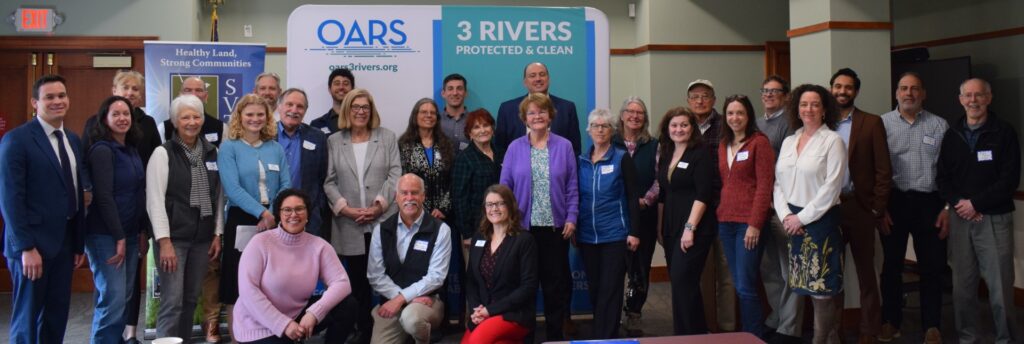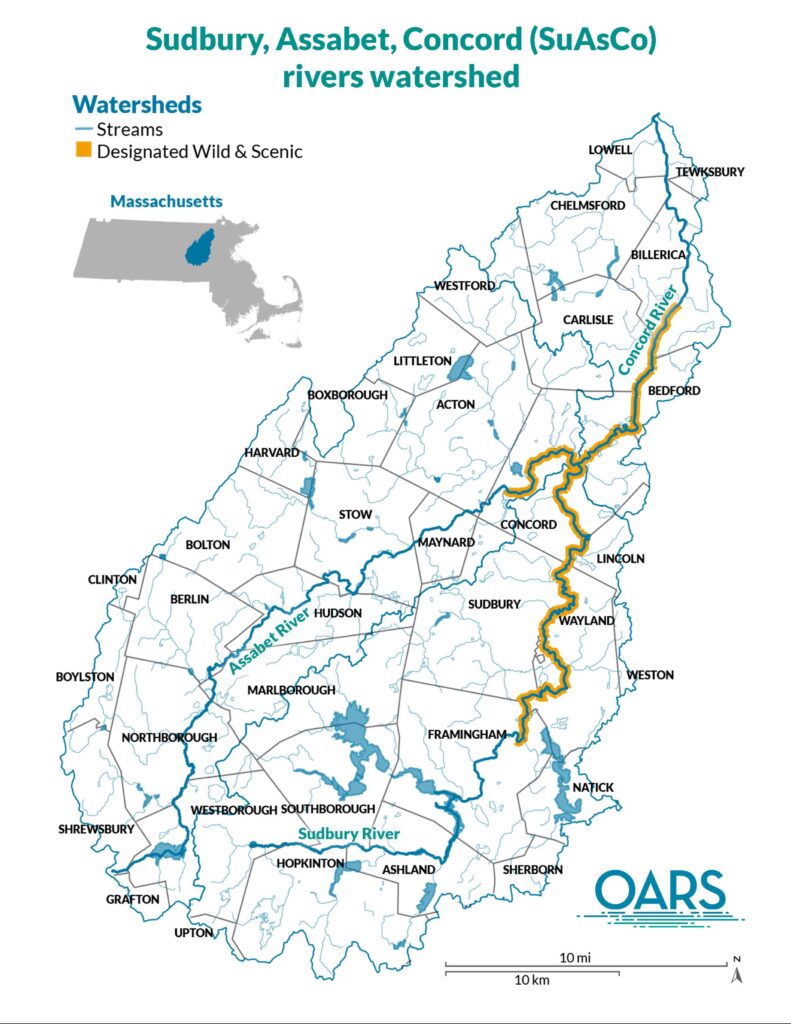“SuAsCo,” the watershed drained by the Sudbury, Assabet and Concord Rivers, was the subject for representatives of environmental organizations from throughout the region. Attendees gathered with Massachusetts state legislators at Goodnow Library in Sudbury on Friday March 29, for a discussion of pending environmental and conservation legislation. Acton-relevant legislation under consideration dealt with water restrictions during droughts, tax credits for small farms and conservations lands, mitigating the impact of PFAS contamination, and much more.

The gathering was sponsored by the Organization for the Assabet, Concord and Sudbury Rivers (OARS), whose mission centers on protecting, improving and preserving these three rivers, and the Sudbury Valley Trustees (SVT) that works to protect natural areas and farmland in this same region. As shown in the map below, the SuAsCo watershed spans the headwaters of the Assabet and Sudbury Rivers in Westborough down to the confluence of the Concord and Merrimack rivers in Lowell. Acton’s entire legislative delegation was in attendance (Senator Jaimie Eldridge, and Representatives Simon Cataldo and Dan Sena) along with a sprinkling of other legislators from across the region.

Participants in the meeting were provided short descriptions of 21 pending bills, covering a wide range of issues from urban farming to rodenticides to pollinators to invasive species to the energy grid. If any of the described bills interests you, you can access the text of the bill, identify sponsors and non-sponsors, and track the progress of the bill by entering the bill number into the Legislature’s website. A subset of the 21 bills was discussed by the speakers at the breakfast.
State Senator Jamie Eldridge spoke on An Act Relative to Maintaining Adequate Water Supplies through Effective Drought Management (S.586). This drought bill would give the Executive Office of Energy and Environmental Affairs the authority to require water conservation measures in any region that the Massachusetts Drought Management Task Force (DMTF) has declared to be in drought. Unlike the local restrictions on non-essential outdoor water use enforced by the Acton Water District and other public water suppliers, the restrictions under this new bill would apply to all residential water uses in the drought region, including private drinking water wells and irrigation wells. Approximately 5% of the residents in Acton get their drinking water from private wells, according to the Acton Water District. At least 19 properties in Acton have private irrigation wells, according to an email from Acton Health Director Penny Funaiole. Acton is currently in a DMTF-declared Level 3 “Critical” Drought.
Kate Hogan of Stow, House Speaker Pro Tempore, spoke about An Act Protecting Massachusetts Public Health from PFAS (H.2450). PFAS (per- and polyfluoroalkyl substances) are a group of synthetic chemicals that have been used in many consumer and industrial products since the 1950’s and have recently been linked to adverse health effects including some cancers, compromised immune system, and altered metabolism, according to the National Institutes of Environmental Health Sciences. The PFAS bill would create a PFAS Remediation Trust Fund, which would be expended to mitigate the impact of PFAS contamination, including in drinking water, groundwater, soil, sediment, surface water, wastewater, sludge or sludge products, and landfills. One source of funding for the trust fund would be the Commonwealth’s share of monies recovered in actions against the manufacture and distribution of PFAS and other PFAS-containing products. Rep. Hogan emphasized that “ultimately, we must limit it at the source” as opposed to trying to extract it from the environment after the fact. To work towards this goal, the bill states that “no manufacturer, distributor, wholesaler or retailer shall offer for sale, sell or distribute in the commonwealth any priority products to which PFAS have been intentionally added on or after January 1, 2029.” Consumer products in which use of PFAS is unavoidable may be exempted for a fee, which would be returned to the PFAS Remediation Trust Fund.
Rob Johnson of the Massachusetts Land Conservation Trust Coalition, spoke about two bills that share the goal of preserving open space. An Act Increasing the Conservation Land Tax Credit (S.2083/H.3147) would expand the annual cap on the state’s conservation land tax credit (CLCT) program from $2 million to $5 million. In his remarks, Johnson described the conundrum faced by property owners, especially elderly property owners, who would love to place their beloved property into a conservation restriction but are languishing on a wait list before they become eligible for the tax credit. In response to a query from the Acton Exchange, Susan Mitchell-Hardt, President of the Acton Conservation Trust, replied that there are currently “zero parcels in Acton on the waiting list. We had one in the queue that was delayed two years due to lack of funding. This bill will certainly reduce that waiting time.”
Although most of the legislation discussed at the breakfast concerned individual bills, Johnson also spoke to a proposed constitutional amendment: A Proposal for a Legislative Amendment to the Constitution Relative to Agricultural and Horticultural Lands (S.11/H.71). The Massachusetts Constitution currently authorizes lower tax rates for agricultural lands, but only on parcels greater than five acres. The proposed amendment would remove the acreage requirement, making farmland of any size eligible for tax relief. In response to a query from the Acton Exchange, the Town of Acton’s Community Conservation Specialist, Ian Bergemann, wrote that “38.75 acres or 11 properties that are currently farmed to some degree (crop, horse, animal) would be able to enroll in that program as they fall beneath five acres.”
Going forward, OARS and SVT plan to make the SuAsCo Legislative Breakfast – which had been halted during the Covid-19 pandemic – a biennial event occurring once per legislative session.
Kim Kastens is an Associate Editor and Board member for the Acton Exchange. She also chairs the Water Committee of Green Acton.

